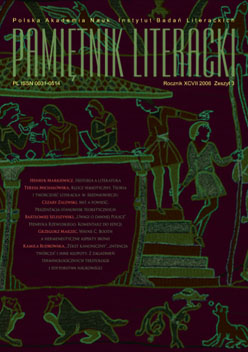Kolęda dawniej i dziś. Z zagadnień semantyki terminów gatunkowych
Kolęda (Christmas Carol) Now and Before. On the Problems of Semantics of Genre Terms
Author(s): Anetta Luto-KamińskaSubject(s): Literary Texts
Published by: Instytut Badań Literackich Polskiej Akademii Nauk
Keywords: Christmas carol; genre term; "rotuła [rotula]"; "kantyka; kantyczka [canticle]"; "pastorałka [carol]"
Summary/Abstract: The article presents two main problems of the term “Christmas carol” – its etymology and a rich designation in a diachronic perspective. A Christmas carol is a religious song, often having a strong secular influence, thematically connected with Christmas, and sung from December, 24th to February, 2nd. Earlier, the term was also used to denote e.g. ‘a gift given to carolers’, ‘a servant’s advance’, ‘a dowry’, and ‘money paid to the landlord during Christmas’. Presently, its semantic range has been narrowed to refer to the religious song in question, a Christmas pastoral’s visit, and a tradition of walking around with a crib. Christmas songs were composed yet in early middle ages, but only in 16th–17th century they came to be called carols. In the following part of the paper the author lists the terms used interchangeably with a Christmas song: rotula, canticle, carol. The last was preserved till the present day to refer to songs with extended shepherds’ scene.
Journal: Pamiętnik Literacki. Czasopismo kwartalne poświęcone historii i krytyce literatury polskiej
- Issue Year: 2006
- Issue No: 3
- Page Range: 123-134
- Page Count: 12
- Language: Polish

